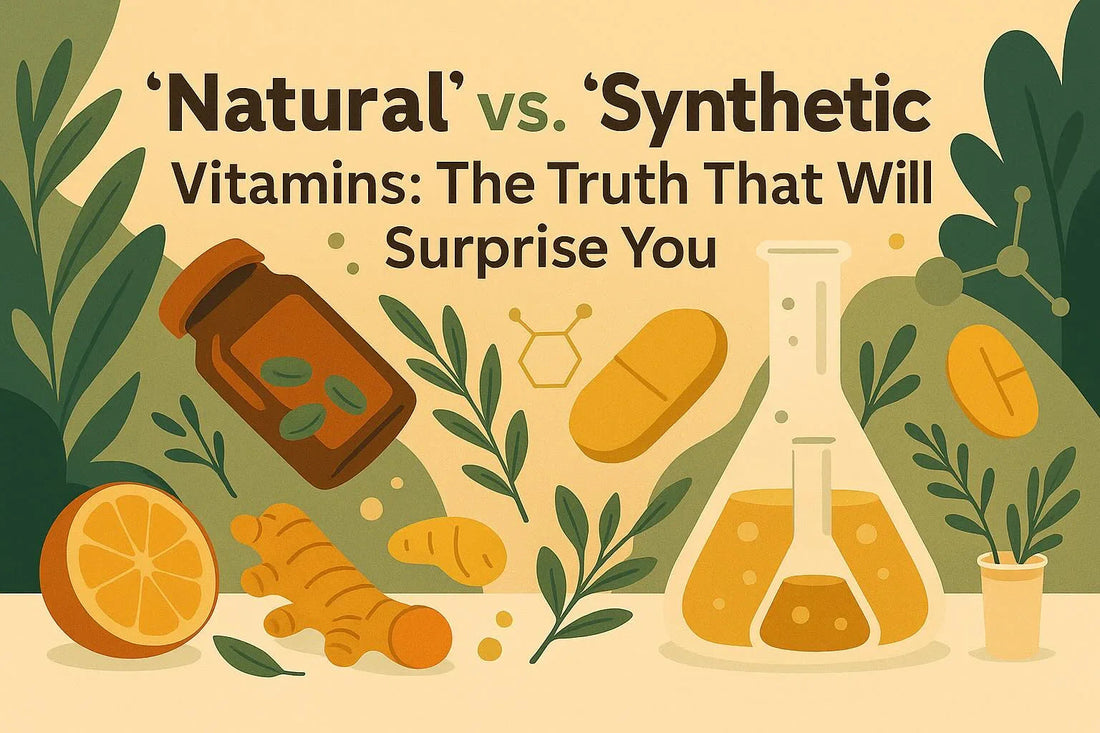📊 'Natural' vs. 'Synthetic' Vitamins: The Truth That Will Surprise You
Plot twist: Sometimes synthetic vitamins are actually better for your dog than "natural" ones.
I know, I know. This goes against everything we've been told about pet nutrition. But after diving into veterinary research papers for weeks, I discovered something that completely changed how I think about supplements.
The "Natural" Marketing Trap:
Every pet supplement company uses "natural" as their selling point. But here's what they don't tell you:
1. "Natural" Doesn't Mean "Bioavailable"
Example: Vitamin E
- Natural form: d-alpha-tocopherol from wheat germ
- Synthetic form: dl-alpha-tocopherol
- The surprise: Dogs absorb synthetic Vitamin E 40% better than natural
- Why: Their liver enzymes process the synthetic form more efficiently
Example: Folic Acid vs. Folate
- Natural: Folate from leafy greens
- Synthetic: Folic acid
- The twist: Dogs can't convert natural folate effectively
- Reality: Synthetic folic acid prevents more birth defects in breeding programs
2. "Natural" Often Means "Inconsistent"
Real example from testing: I sent 5 "natural" vitamin supplements to a lab. The same vitamin content varied by 300% between products. Why? Natural sources have seasonal variations, processing differences, and storage issues.
Synthetic vitamins? Consistent within 2% every time.
3. "Natural" Can Actually Be Harmful
Case study: Natural Vitamin A from fish liver oil
- Contains other compounds that can be toxic in high doses
- Difficult to standardize dosages
- Can cause hypervitaminosis A in small dogs
Synthetic Vitamin A:
- Pure, predictable, safe dosing
- No toxic co-compounds
- Precisely what your dog needs, nothing more
When Natural IS Better:
Complex nutrients: Omega-3s from fish oil beat synthetic alternatives
Enzymes: Natural enzyme complexes work better than isolated synthetic enzymes
Antioxidants: Natural vitamin C complexes with bioflavonoids are superior
The Real Question Isn't Natural vs. Synthetic...
It's: "What's most effective and safe for my dog?"
How to Evaluate ANY Supplement:
Instead of asking "Is it natural?" ask:
- Bioavailability: How well can my dog absorb this?
- Purity: Are there harmful contaminants?
- Consistency: Will every dose be the same?
- Research: What studies support this form?
- Safety: What's the risk of overdose or interactions?
Examples from My Medicine Cabinet:
✅ Synthetic I Choose: Folic acid, Vitamin D3, B-complex
✅ Natural I Choose: Fish oil, enzyme complexes, probiotics
🤷 Either Works: Vitamin C, Zinc (depends on specific product)
Red Flags in Marketing:
❌ "100% natural" (often means unprocessed and poorly absorbed)
❌ "No synthetic ingredients" (eliminates some of the most effective options)
❌ "Chemical-free" (everything is made of chemicals, including water)
The Veterinary Reality Check:
Dr. Sarah Mitchell, veterinary nutritionist: "I've seen dogs with deficiencies while taking 'natural' supplements, and perfect blood work on synthetic ones. The goal is health outcomes, not marketing categories."
Your Turn:
- Check your current supplements - natural or synthetic?
- Have you noticed different results between types?
- What "natural" marketing claims influenced your purchases?
Controversial opinion: The best supplement is the one that actually works, regardless of how it's made.

